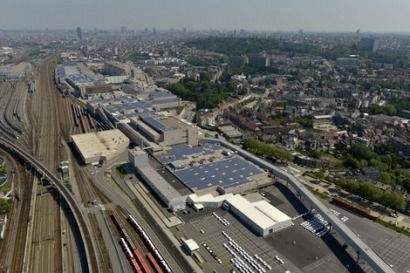
The electricity generated by the rooftop array will be used exclusively for the production of Audi’s A1 model. The installation was officially opened on May 28th 2013 with Günther Oettinger, Commissioner for Energy at the European Commission and Brussels Minister for Energy and Environment Evelyn Huytebroeck in attendance.
The 3.6MW rooftop installation was built by REC’s partner company Eoluz and is the largest such array in the Brussel’s region. It is expected to generate more than 3,000MWh of clean green electricity per year which will be used entirely by Audi to support the company’s A1 model production lines.
“We are very pleased that Eoluz and Eneco have decided to use our high-performing REC Peak Energy Series solar panels for this roof-based installation at AUDI,” said Guido Breens, REC Business Development Manager for Benelux and the UK. “Self-consumption directly rewards consumers’ efforts to optimize energy consumption. We at REC, see that self-consumption solar installations are on the rise in many European countries. The Audi project in Brussels demonstrates that third party financed solar projects with self consumption on the site are profitable.”
The installation is an essential element for Audi which is keen to fulfil its current obligation to ensure the sustainable and efficient manufacture of its cars which are considered to be some of the most environmentally friendly vehicles on the market. The production plant for the A1 model also meets stringent environmental standards and consequently is now able to reduce its carbon emissions by 2,200 tons, equivalent to 22 million kilometres of car-based journeys per year.
“REC solar panels were selected for this project based on the fact that our previous experiences and installations have affirmed the high quality of REC people and products” commented Jan Brouckaert, Managing Director of Eouluz. “Our own test installation with REC Peak Energy Series solar panels at our office reasserted the excellent power output. One additional feature of REC is the low carbon footprint to produce solar panels – they have an industry-leading energy payback time of only one year.”
The project was funded by Eneco Belgium, a company that has set itself the goal of becoming the most sustainable energy utility company in Belgium by 2016 with a target of generating electricity from renewable sources only.
“We are delighted that Audi decided to produce energy from the sun, which corresponds to our vision” said Paul Minjauw, Managing Director of Eneco Solar. “We hope that this is the first of many milestones for companies in Belgium deciding to invest in sustainable projects.”
Brussels has set itself the target of generating eight percent of its electricity from renewable sources by 2020 in line with Belgium’s national target of 13 percent from renewable sources. Solar energy installation is therefore an important part of that objective.
Further information:

